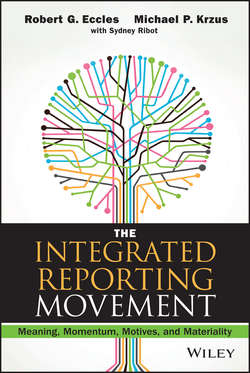Читать книгу The Integrated Reporting Movement - Eccles Robert G. - Страница 7
На сайте Литреса книга снята с продажи.
Chapter 1
South Africa
ОглавлениеIn 2011, South Africa became the first country to require integrated reporting on an “apply or explain” basis.1 In 2014, it remains the only country to have done so. Since the Johannesburg Stock Exchange (JSE) added King III to its listing requirements – which as of 2011 have included integrated reporting – some 4502 South African companies have been filing reports that present both financial and nonfinancial information3 in a meaningful way. While a variety of proposals related to sustainability and integrated reporting have been submitted in countries of the European Union,4 and while an initiative by the World Federation of Exchanges slated for discussion in 20145 would require some form of nonfinancial reporting,6 no other country has shown signs of implementing such a far-reaching requirement.
Those not deeply entrenched in the topics of corporate governance and reporting are often surprised to learn that South Africa is the first country where integrated reporting was given a widespread mandate. Indeed, in 20 years the country's corporate governance code went from being undeveloped to regarded as an international vanguard. The governance principles that would launch South Africa's integrated reporting journey coincided with the country's first multiracial elections in 1994. In codifying values of stakeholder inclusivity – the idea that nonshareholder interests and expectations should be taken into account during strategic decision-making – those principles testified to a burgeoning democracy's effort to create structural and corporate transparency where, previously, corruption had prevailed. Because integrated reporting's meaning in South Africa – for companies, investors, and the country as a whole – must be seen in the context of its evolution from corporate governance principles, and because the movement has gathered more momentum in South Africa than any other geography, we will describe the motives of the key individuals and groups that led to this recommendation, ultimately reviewing the results of this country's experience.
1
A 2012 report compiled by Jess Schulschenk for Ernst & Young South Africa refers to the 2009 King Code as transitioning from a “comply or explain” to an “apply or explain” approach. Although integrated reporting is not “mandatory” in a strict legislative sense, for convenience we will use this term throughout the chapter with the understanding that it means “comply or explain,” and following the 2009 King Code's appearance, “apply or explain.” “Interview Summary Report.” Compiled by Jess Schulschenk in collaboration with the Albert Luthuli Centre for Responsible Leadership at the University of Pretoria. Published by Ernst & Young South Africa. August 2012. 1–40. In February 2010, the principles of the King Code of Governance of 2009 (King III), including those that recommend integrated reporting, were incorporated into the Johannesburg Stock Exchange's listing requirements and listed companies were obliged to apply the King III principles or explain their reasons for deviating from them (for financial years starting on and after 1 March 2010). SustainabilitySA. www.sustainabilitysa.org, accessed May 2014,
2
Not all listed companies produce integrated reports. There is no accurate number of the number of companies that do.
3
Nonfinancial information refers to environmental, social, and governance (ESG) information that reflects company performance in these areas.
4
On April 16, 2013, the European Commission issued a proposal to require large EU companies to report on social and environmental issues in annual financial reports. “Proposal for a Directive of the European Parliament and of the Council amending Council Directives 78/660/EEC and 83/349/EEC as regards disclosure of nonfinancial and diversity information by certain large companies and groups.” European Commission. Strasbourg, France. April 16, 2013, http://eur-lex.europa.eu/LexUriServ/LexUriServ.do?uri=COM:2013:0207:FIN: EN: PDF, accessed April 2014. On April 15, 2014 the plenary of the European Parliament adopted this directive by a vote of 599 to 55 from its 28 member states. http://ec.europa.eu/internal_market/accounting/non-financial_reporting/index_en.htm, accessed April 16, 2014. In July of 2010, France took a step towards mandating integrated sustainability and financial reporting for large companies with a law called Grenelle II, Article 225 of which states that all listed companies on the French stock exchanges, including subsidiaries of foreign companies listed in France, and unlisted companies, must incorporate information on “the social and environmental consequences” of company activities or publish a justification for the exclusion of information if it is deemed irrelevant. Ernst & Young. “How France's new sustainability reporting law impacts US companies” 2012, http://www.ey.com/Publication/vwLUAssets/Frances_sustainability_law_to_impact_US_companies/$FILE/How_Frances_new_sustainability_reporting_law.pdf, accessed February 2014.
5
Brazil's BM&FBOVESPA and India's Bombay Stock Exchange have taken concrete steps to encourage listed companies to use sustainability reporting, and eight member exchanges of the World Federation of Exchanges (WFE) have joined the UN's Sustainable Stock Exchanges initiative to help research how stock exchanges can facilitate corporate transparency. In 2012, the WFE published the first “sustainability disclosure ranking” to benchmark the annual change in performance of global stock exchanges. Morrow, Doug. “Measuring Sustainability Disclosure on the World's Stock Exchanges.” World-Exchanges.org, http://www.world-exchanges.org/insight/views/measuring-sustainability-disclosure-world%E2%80%99s-stock-exchanges, accessed February 2014.
6
Also known as social accounting, nonfinancial reporting is the process of communicating the social and environmental effects of an organization's economic actions to society at large and particular stakeholders (interest groups). PwC. Audit and Assurance Services, “What is corporate reporting?” http://www.pwc.com/gx/en/corporate-reporting/frequently-asked-questions/publications/what-is-corporate-reporting.jhtml, accessed February 2014.
